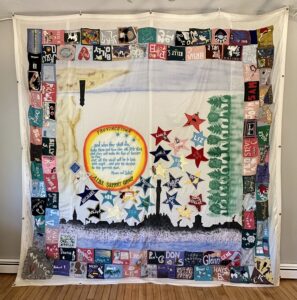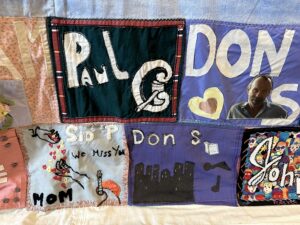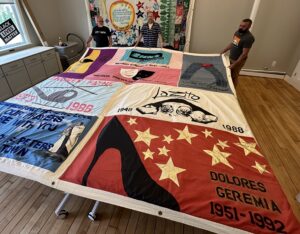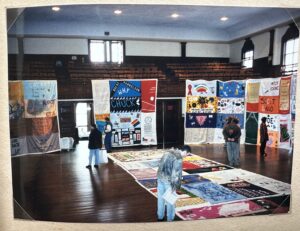PROVINCETOWN — The AIDS Memorial Quilt, which now includes 50,000 cloth panels honoring more than 110,000 people who have died of AIDS since 1981, has long been too large to travel the country in its entirety. The last time the whole quilt was unfurled in one place was 1996, when it covered the Washington Mall and more than a million people came to see the handcrafted memorial.

Panels of the AIDS Quilt used to come to Provincetown regularly, however, including in 1997, 1998, and 2002. They were taken to high schools all around the region to increase awareness of the disease — and to help humanize its victims and fight discrimination.
Until this month, no panels of the AIDS Quilt had been here since 2014, said Bill Furdon, a program director and case manager at the AIDS Support Group of Cape Cod. Furdon helped sew the AIDS Support Group’s 12-by-12-foot quilt panel in 1989.
After a 10-year absence, that panel was hung on June 7 at the AIDS Support Group’s headquarters on 96 Bradford St., where it will be on display until after World AIDS Day on Dec. 1. It contains the names of 113 people who died in Provincetown between 1983 and 1992 — starting with Glenn, a man who came from Boston in 1982 and died so quickly that the nurse who cared for him, Alice Foley, wasn’t able to get his last name.
“Glenn was the first person to die of AIDS here,” said Furdon. “They didn’t know what to do with him in Boston, so they sent him to Provincetown.”
Foley donned protective gear, cared for Glenn, and founded the Provincetown AIDS Support Group not long after, Furdon said. For its first 12 years, the organization principally arranged medical appointments, home support, and hospice care.

In 1989, the AIDS Support Group’s panel included 44 names of people who had died in Provincetown surrounding four town landscapes: the skyline, the harbor, the dunes, and the beech forest.
Only two years later, an outer ring was added with the names of 48 more people who had died in Provincetown.
In 1992, almost two dozen stars were added with even more names, Furdon said.
“Dolores was a performer — we put this stage around her star with a little curtain,” said Furdon. “Don loved Christmas, so there’s a nutcracker ornament on his star. Paul Christo was the select board chair, so we put a gavel on his panel.”
Provincetown’s annual town report from 1988 shows a smiling Paul Christo flanked by his fellow select board members: Mary-Jo Avellar, Elizabeth Steele, Edward Rudd, and Delores DeSousa.
Christo died during his reelection campaign in April 1989 and received 152 votes even after his death, according to the 1989 annual town report.
Most panels of the AIDS Memorial Quilt follow a different format from the one on display on Bradford Street: they consist of three-foot-by-six-foot pieces stitched together, each one dedicated to a single person who died. When laid on the ground, the individual pieces are each roughly the size of a person’s grave.

The AIDS Support Group has had three more panels of the 50,000-panel quilt sent to Provincetown this year, each of which has at least one reference to the town. They are not on public display yet, but ASGCC CEO Dan Gates said the organization is working on a plan to create a combined display of several panels in time for World AIDS Day.
Block 4,488 includes a piece submitted by the Church of St. Mary of the Harbor in Provincetown that names 22 parishioners who died of AIDS, including three couples.
Block 83 has seven pieces on it, none with locations noted, and an eighth piece with a setting sun that simply says, “Provincetown, Anonymous.”
Block 3,949 has a piece submitted by “The Family of St. Peter’s, Provincetown” and four more pieces that memorialize people who lived or died here.
Michael Prevulsky, who died at about age 35, was a director at the Provincetown Theatre Company. Dolores Geremia was a performer in Prevulsky’s production of Dracula, and her quilt panel includes a black high heel and a profusion of stars.

Richard Weinstock was briefly the owner of Rick’s Pub and Tavern, which is now the Monkey Bar at 149 Commercial St. He opened his restaurant in 1991, according to David W. Dunlap’s compendium Building Provincetown, and died of AIDS in 1993.
His “Rick’s Provincetown” logo, which featured piano keys and a musical staff, is reproduced in black and teal on his piece of the quilt.
Furdon said he remembers those three clients — but he remembers the fourth person on that panel, Leslie London, the best.
“She always went by Leslie London, when she was performing in drag and when she wasn’t,” Furdon said. “We never knew any other name for her until she died.”
London’s quilt piece shows her under a spotlight in a shiny gold dress, facing an invisible audience. She died in 1990 at 45 or 46.
When panels of the AIDS quilt came to Provincetown in 1997, they were hung from the balcony of the town hall auditorium, enclosing viewers in the fabric memorial. Two hundred seventy-seven people had died in Provincetown by that time, according to the AIDS Support Group’s records, and another 152 died in the 20 years that followed.
Gates said he wants to reproduce that feeling of enclosure this fall as World AIDS Day approaches by creating a box-like space at 96 Bradford St. where people can quietly reflect.
“It would take up this entire room,” said Gates. “No matter how you see it, the Quilt is a lot to take in.”



